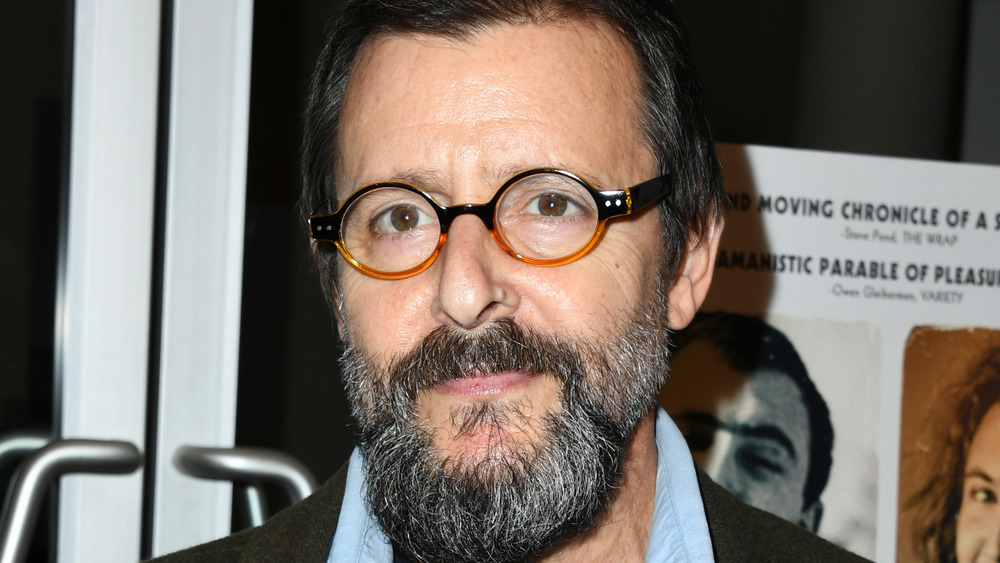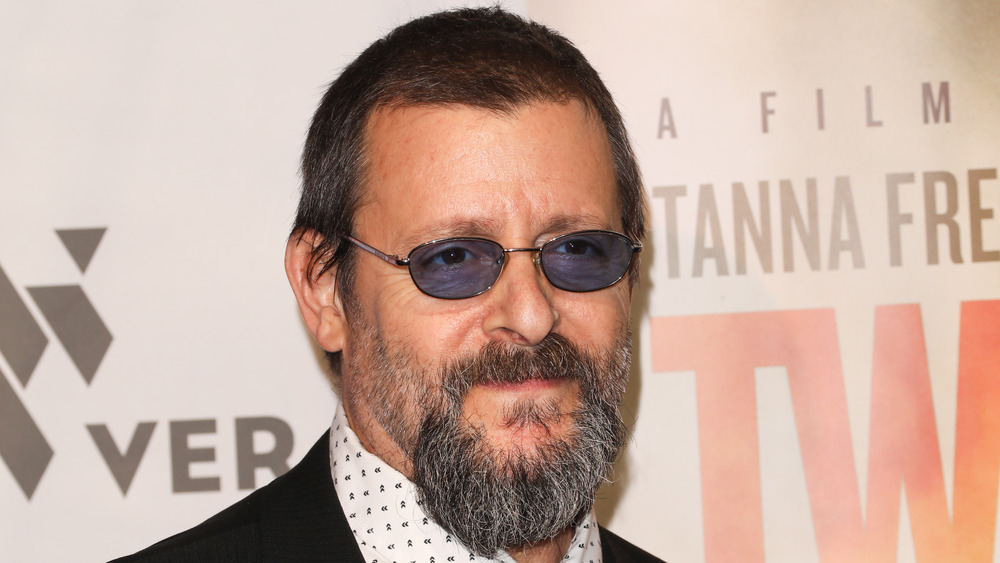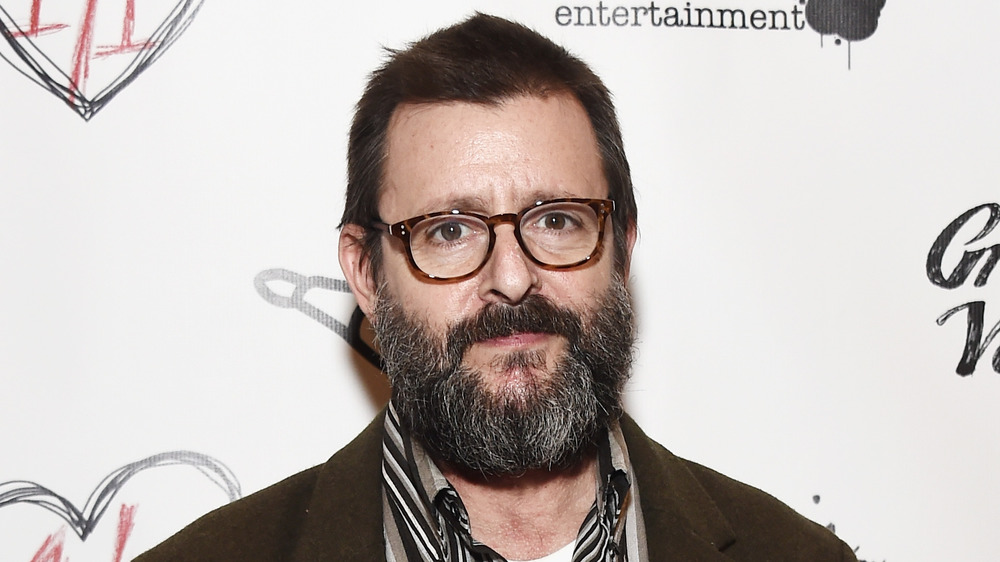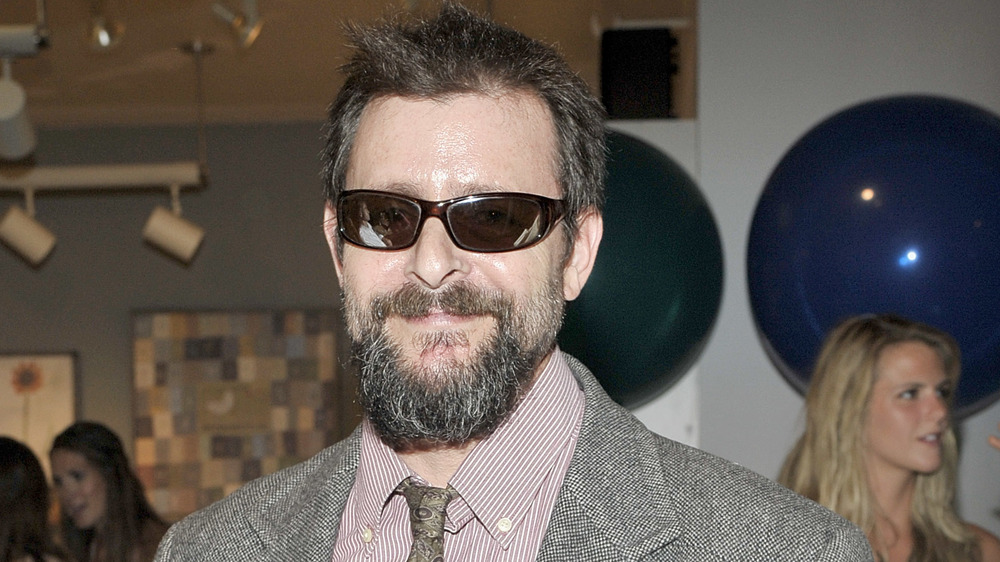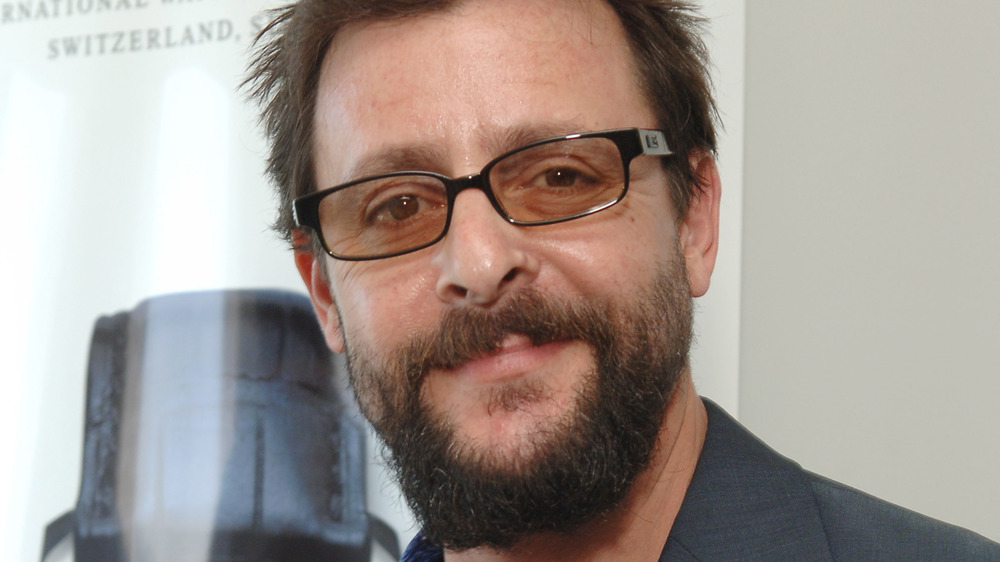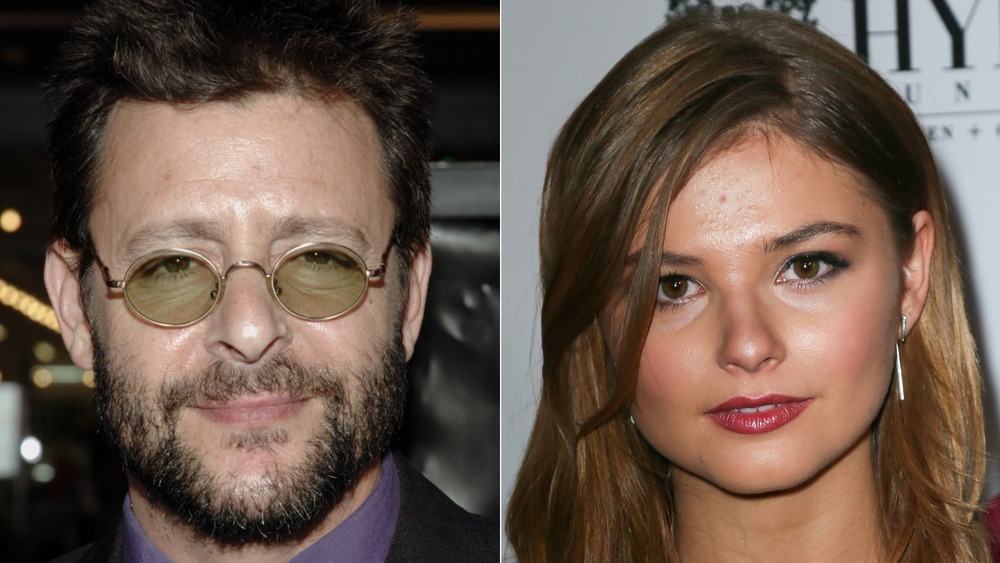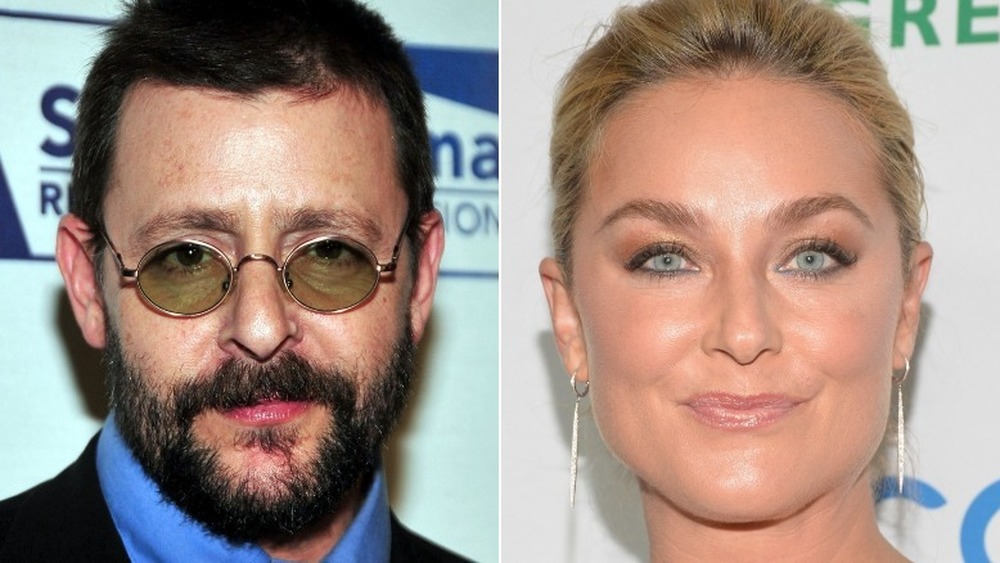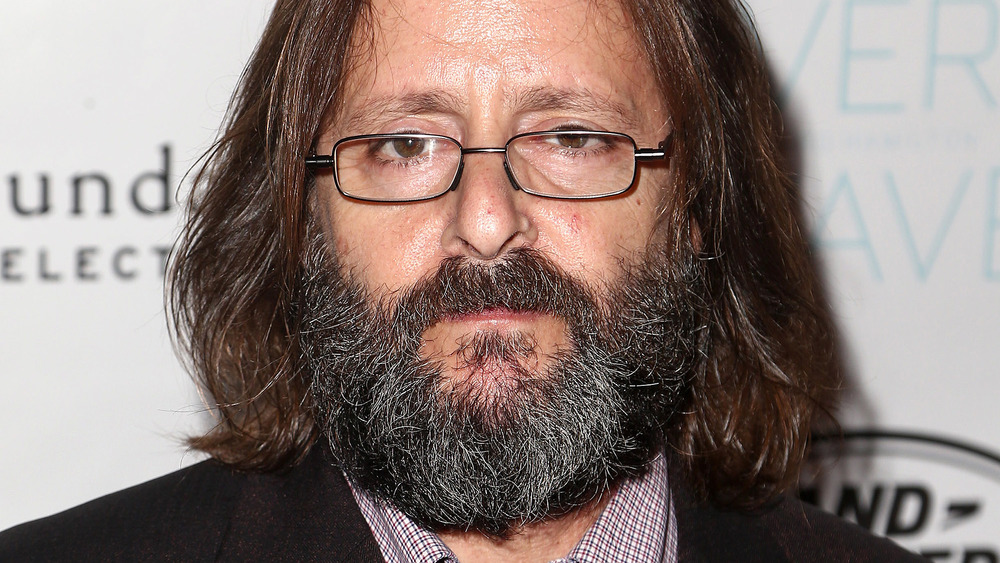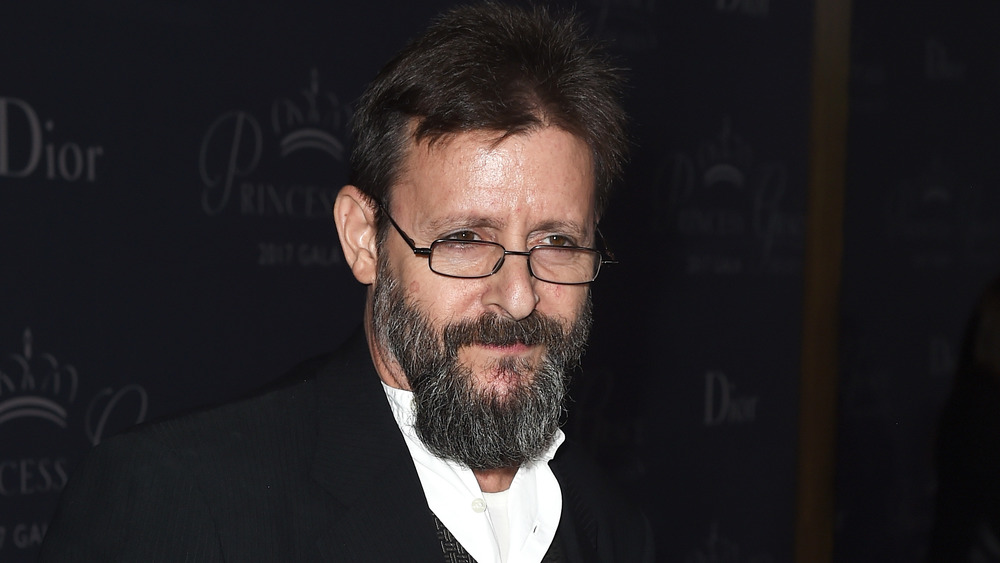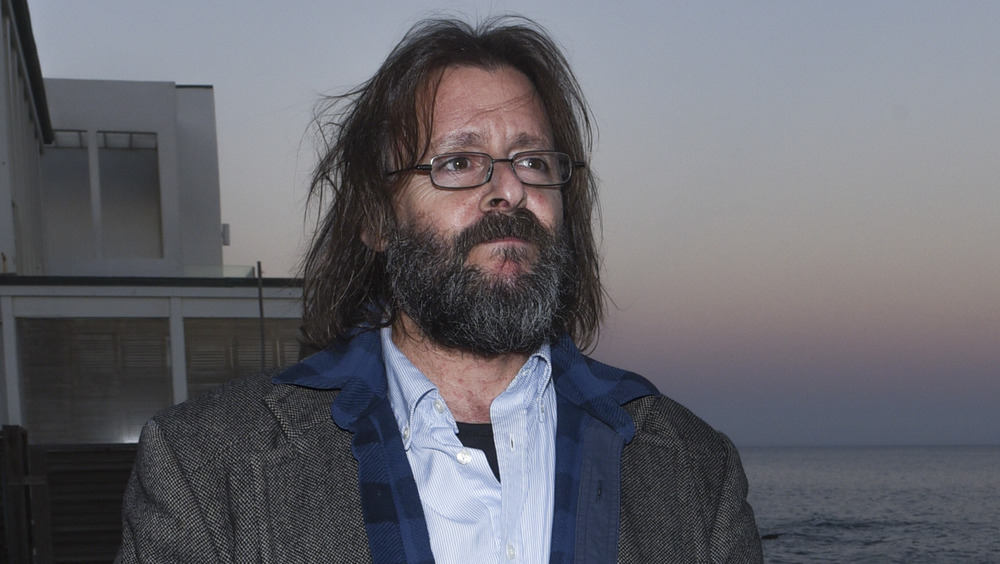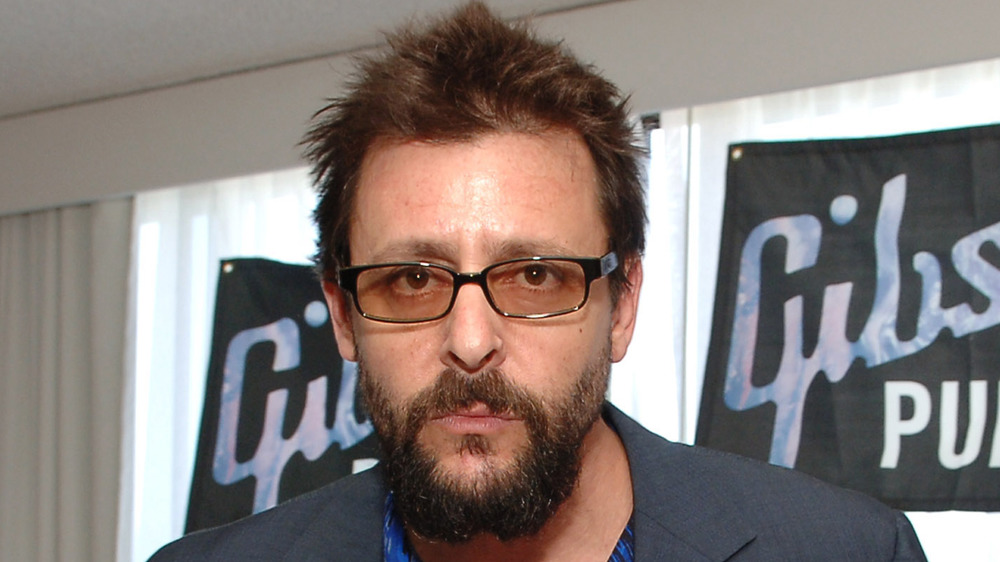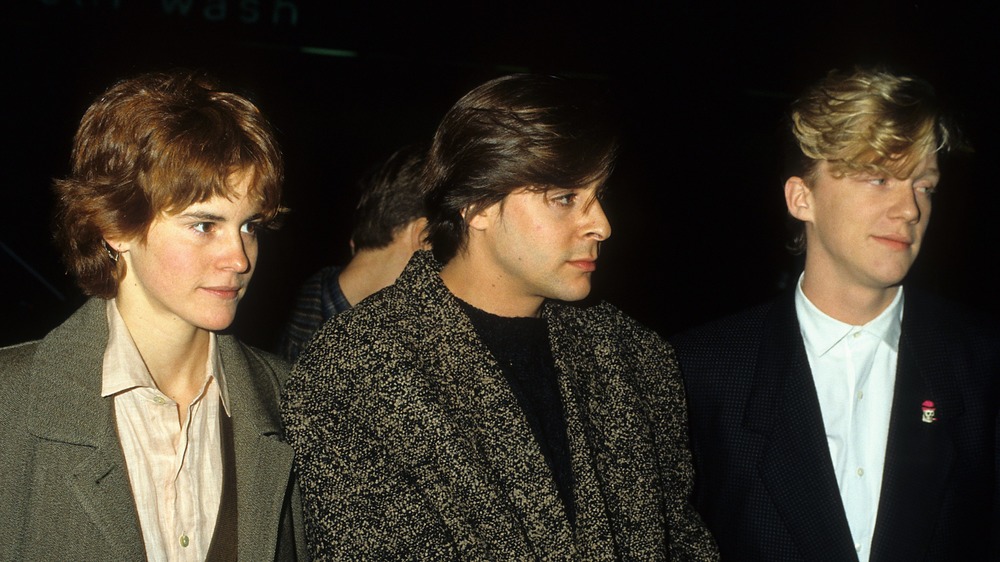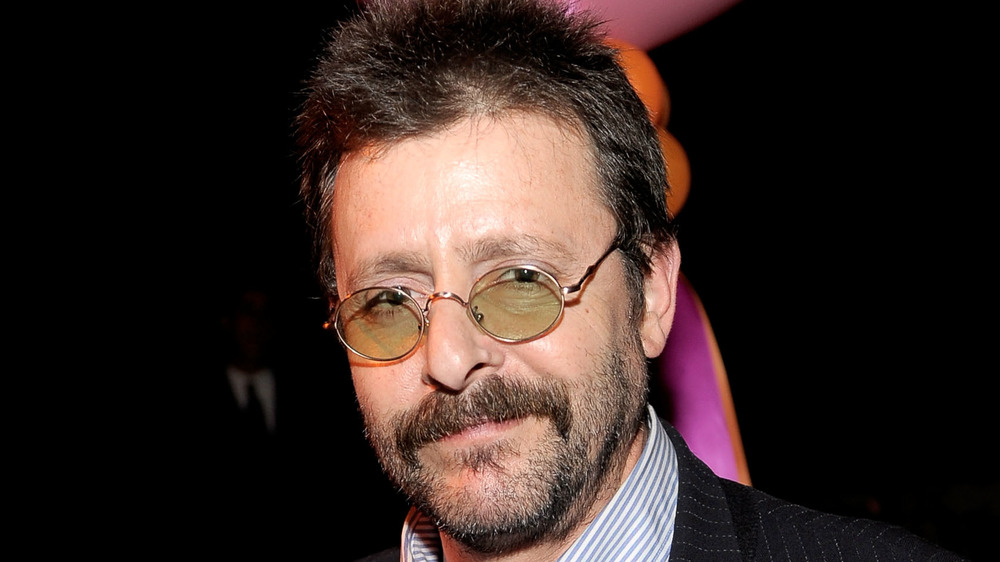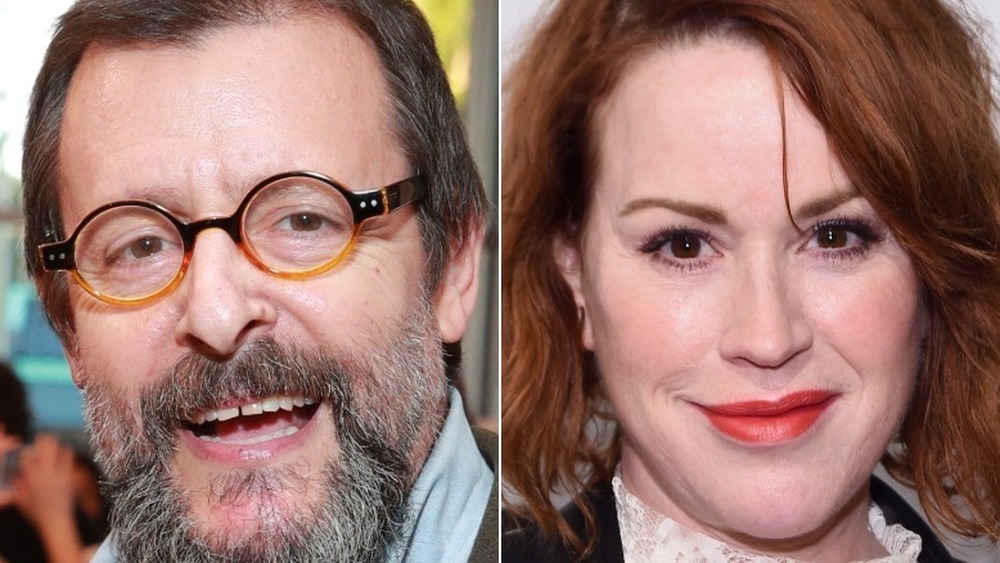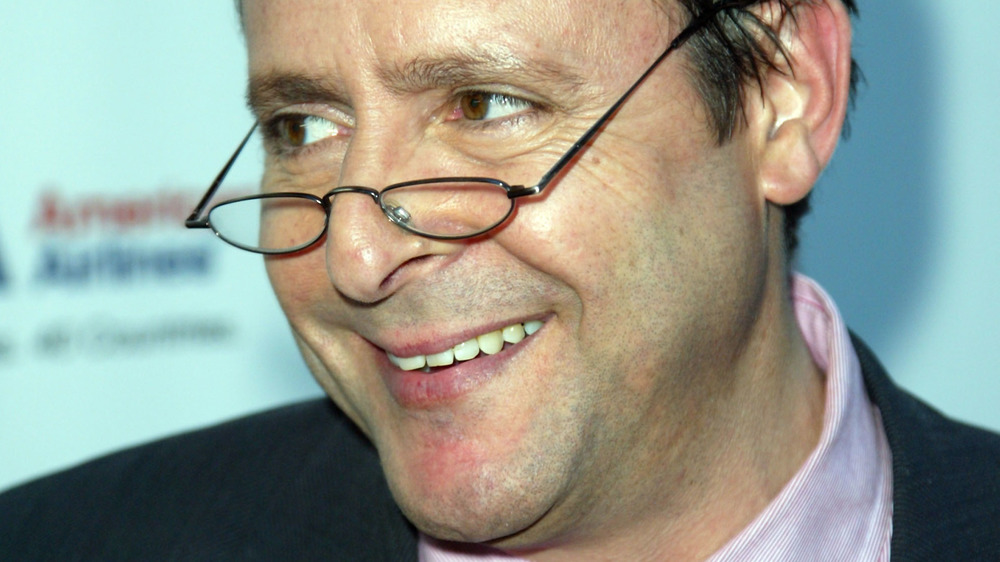The New Judd Nelson Lifetime Movie You Need To Put On Your Must-Watch List - Exclusive Interview
**Warning: This article contains discussion of child abuse, domestic abuse, and sexual assault**
Let's be real, Judd Nelson has been in our lives, and hearts, for a very long time. In 1985 he starred in two iconic hits that captured the spirit of that era, The Breakfast Club and St. Elmo's Fire. Those movies made him a star but came with a catch. Nelson and his '80s acting pals Rob Lowe, Emilio Esteves, Anthony Michael Hall, Andrew McCarthy, and Ally Sheedy, were derisively dubbed the "Brat Pack" by a fawning yet spiteful tabloid press that followed their every move.
Those '80s excesses long behind him, Nelson is back for what may be the darkest film of 2021, the Lifetime original Girl in the Basement, directed by Elisabeth Rohm. The film is largely but based on the gut-wrenching but somehow true tale of Elisabeth Fritzl, a teenager who was locked in a makeshift underground prison by her own father for an unimaginable 24 years. Nelson plays this notorious father, loosely based on Josef Fritzl, and dove headfirst into portraying a man responsible for one of the most famous cases of incest and domestic abuse of all time.
In an exclusive interview with Nicki Swift, Nelson spoke about shooting some of the most difficult scenes of the film with talented newcomer Stefanie Scott, his favorite project of all time, whether or not he keeps up with his old Brat Pack pals, and the state of the film industry.
Judd Nelson reveals his reaction to the true story of Elisabeth Fritzl's torture
You play a very psychopathic father who secretly builds a prison in his own basement to hold his daughter captive for 24 years. How could anyone grow up in a house with that going on and not know it was happening?
Maybe we're helped by the fact that it's for television. So we can't be as explicit as we might, or maybe we're hurt by that because then you can't see the details of the place that's constructed. And I think that the key to the story is that he builds a place that is absolutely soundproof, and there are a series of doors that you'd have to have keys to get all the way in. And you'd never suspect it.
The wife and the other daughter have looked right at the wall where the door is and they're like, "There should be something here, but there isn't." They never hear anything, they never see anything. And the story that it's based on is incredible. It's like if someone were to have written it and said, 'Oh, fiction, no one would buy it,' they'd be like, 'Come on, man. This is ridiculous.' This happened. Much worse than the movie portrays.
Do you remember your reaction to the Elisabeth Fritzl story when it came out? Did you have a reaction to it personally?
Yeah. It's one of those ones you go ... I know a lot more now about it now than I did then. But what I thought then was the mother's lying, there's no way the mother didn't know, and then the guy, he grew up under Nazi rule. He was born in 1935. So, when the war's over, he's 10 years old. He's got a single mom that treated him like crap. I didn't realize how badly he was raised. And it needed those factors to create that type of villain, because he does not think he's a villain.
He thinks he's a good dad. He says, "I'm helping this girl. Someone's going to help her." And it's like the cauldron that created this person. And what's amazing, the Fritzl thing, all his friends were really legitimately shocked when this all came out. They all loved him and thought he was a good guy. Pleasant, funny, great sense of humor. It's like, Oh my God. I don't know whether that's decompartmentalizing of your life or schizophrenic or just driven. I don't know what it is. It just is amazing to me. And he spent, Fritzl did, six years building that thing by himself.
If you or someone you know may be the victim of child abuse, please contact the Childhelp National Child Abuse Hotline 24/7 at 1-800-4-A-Child (1-800-422-4453) or contact their live chat services at www.childhelp.org.
How Judd Nelson got into the evil mind of a notorious domestic abuser
In the real case, this bunker Elisabeth Fritzl was trapped in for 24 years was under construction for many years. How could the rest of the family in a story like this possibly not know?
No, no, no, no. No one knew about it. It's strange because eventually, he was, like, shopping at two different grocery stores. One for upstairs and one for downstairs. But he was building it... He was an engineer. He was an electrical engineer, which was his job.
This is one of the things that I was fighting for, was to have a job that gave him a leg up to do something like this. But we didn't really get around to making that specific and clear because I think that's an important element to it, which is like, I couldn't build something like that. I'd need help. I'd be like, "How do I do this?" It would be like, everyone would know. Here's a guy asking how you build a f***ing dungeon.
Right, getting zoning permission for an underground dungeon might raise some eyebrows.
Yeah. And also that after the war, I don't know whether Austria has really ever dealt with their responsibility of World War II. It's like, "Oh no, the Germans in this world." Yeah. Okay. Whatever. During the time period, maybe 30 years ago, 40 years ago in Austria, the worst thing a parent could be was lax. There were advertisements on the TV, "Be strong. Don't let these kids get away with this."
While the sixties are happening everywhere else, in Austria, they were making sure it did not happen there. So you could err on the side of beating your kids. That would be okay. Beat them. It's like post-World War II, they lost. So it's like, "What is this thing?" And he was raised by a single parent. It's interesting because it wasn't the Fritzl biopic.
If you or someone you know may be the victim of child abuse, please contact the Childhelp National Child Abuse Hotline 24/7 at 1-800-4-A-Child (1-800-422-4453) or contact their live chat services at www.childhelp.org.
What Girl In The Basement reveals about domestic violence
So this isn't exactly the story of Elisabeth Fritzl. It's a blend of stories like this, right?
It's a blend. So the thing is, we worked to make the script as tight as possible and as believable as possible because, the Fritzl thing, it really happened. It's like, you go, "Oh, under whose watch?" Under everyone's watch, it happened. And I think why it's important now is that these things still go on. That guy in Cleveland about four years ago had those three women that he'd had for 10 years in his house.
Yeah. I remember that. Ariel Castro held those girls captive for ten years.
And I think there's a problem if we're always saying like, "Oh I know nothing. Don't bother me and I won't bother you. I don't want to know what happens there. I'll mind my own business." That's not a community. The only way we [made] it out of the cave dwellers was with community, with working together, looking out for each other. And it's strange that things happen now right under our nose and we don't know anything about it.
If you or someone you know may be the victim of child abuse and/or domestic abuse, please contact the Childhelp National Child Abuse Hotline 24/7 at 1-800-4-A-Child (1-800-422-4453), contact their live chat services at www.childhelp.org, or call the National Domestic Violence Hotline at 1−800−799−7233 or TTY 1−800−787−3224. You can also find more information, resources, and support at www.thehotline.org.
How Girl In The Basement also portrays the worst mom ever
Something else noticeable about this film is, the mother, she doesn't even ask about a private investigator for multiple years after her daughter's missing. No one is looking for this woman. Even the boyfriend character, there are kids of incest in that basement before he even really talks about searching for this girl seriously. It's neglect too right?
Well there's no mishap. Meaning he's so tightly controlling it. You think it's impossible — "How can you do this?" It's like, "How could they build the atomic bomb?" Well, you have to follow certain guidelines. You can't make any mistakes. Joely Fisher is so damn good because we don't doubt her sincerity. And that's important. Because it's a little bit hard to believe that she wouldn't know. Joely Fisher plays it in a way that you go, "My God, she's sincere. She wants to find that kid as best she can." Again, in the time period that the real story takes place, like 10 years ago, 15 years ago, and in that culture, the wife did not contradict the husband very often. So if he said, this is the way it is, you best not argue with this.
Because Fritzl had seven kids upstairs and seven kids downstairs. He had three kids raised upstairs by his wife. It's like, "Wow, wow." It's so tight, his plan, that no one suspects it. It's only when they let the girl go to the hospital. And even then in the true story, the cop at the hospital thinks it's something a little strange. So the cops take the two of them to the police station because they want to ask them some questions. Fritzl's like, "Hey, nothing's wrong," and he's very charming and she won't say a word. She's absolutely silent. She won't say anything. It takes a long time, a couple of hours for them to finally get her to talk. And she says, she'll only talk if they can guarantee that she'll never have to see him again.
It's so strange. There's so much we don't know. So it leaves it open for an interpretation for a script. But as long as you don't overstep what makes logical sense. Some stuff you have to make adjustments because it's TV. Some stuff you have to make adjustments because it's America, and some stuff you have to make adjustments because over the course of 20 years, a lot of things happen. But the kids in the movie, I thought were great.
If you or someone you know may be the victim of child abuse and/or domestic abuse, please contact the Childhelp National Child Abuse Hotline 24/7 at 1-800-4-A-Child (1-800-422-4453), contact their live chat services at www.childhelp.org, or call the National Domestic Violence Hotline at 1−800−799−7233 or TTY 1−800−787−3224. You can also find more information, resources, and support at www.thehotline.org.
Judd Nelson on his harrowing scene with Stefanie Scott
Stephanie Scott is really good in Girl In The Basement. You were also a big movie star at her age. Do you see that for her too?
Oh, I don't know. It seems like a retrospective term. Like, let's look back on the career of Sidney Poitier. It's hard to anticipate anything really. Who knows what people are going to like, or not like. A film can be great, but no one will see it. So it's like, you didn't even do it. You can do terrible work in a terrible movie that makes $200 million in a year and you're like walking on water. So it's like, you can't really plan for the results. You have to make sure that you like to work for work sake and then, everything will be fine.
Towards the beginning of the film, there's a rape scene between you and Stefanie Scott's character. Is something like that really hard to film? I can imagine afterward it could be awkward because you are recreating the violence of it.
It is because it just feels like ... There's no doubt ... You're not raping her, but that is your hand on her. So there is that actual physical contact. And also it's like, you don't want to break anyone else's process. You don't want to damage how they work. I mean, some actors will, whatever, let the chips fall where they may and they'll just, like, go through it. I mean, there are a million ways to skin a cat, none of which are good for the cat. So you don't want to be a cat. We were helped because some of this stuff we can't show because it's for TV. So there's like an invisible wall that you can't do stuff that's never going to make it to the film anyway.
If you or someone you know may be the victim of child abuse and/or sexual, please contact the Childhelp National Child Abuse Hotline 24/7 at 1-800-4-A-Child (1-800-422-4453), contact their live chat services at www.childhelp.org, or the National Sexual Assault Hotline at 1-800-656-HOPE (4673) or visit RAINN.org for additional resources.
Working with first time director Elisabeth Rohm was a breeze for Judd Nelson
You've worked with one of the most iconic directors in Hollywood history in John Hughes, what was it like working with a fellow actor and now first-time director Elisabeth Rohm?
We had a first-time director who you never would have thought was a first-time director. Not a single second in the whole movie, my experience working with Elizabeth that I go, "That's a first time director." No. All the experience she has as an actress transferred perfectly to her as a director. And she was very attentive. I didn't want to do anything that was going to hurt the actress. And I didn't want to do anything that was going to hurt the movie. It's important that you keep within everyone's responsibilities.
A great movie is like a Swiss watch. Every piece does its function perfectly in concert with all the other pieces. You can't have the winder knob deciding one day, "I want to be the small hand." Like, "What, are you out of your mind?" That's a broken watch. So a good director, the key always is the script. You always want to have more time to get the script as tight as possible. But after that, under the guidance of a good captain, you can make a good journey. And she was really easy to work for.
Judd Nelson says villains don't know they're evil
When we talk to actors playing movie villains, sometimes they say they have the most fun in these kinds of roles because they can really ham it up. But this is not quite like that. The material's so dark. Were you able to have any fun, to get into the fun of being bad?
I don't think that villains, except in a cartoon, think they're villains. For all we know, Manson didn't think he was a villain. Jeffrey Dahmer, maybe thought he was just a lover who was misunderstood. Who the hell knows? And Don does not see himself as a villain. It's this girl that's going to have to learn. She's not maturing, she's not accepting responsibility for her actions, so she's going to have to learn this. The script doesn't tell us that he had lustful desires for her before she was kidnapped and basically imprisoned. It's only after he has that complete control over her, that this other thing starts to happen.
And that is something I don't think he planned on. It's not anything that he's mad at now. I mean, it's like, "Well, it seemed natural." It's all part of that same bill of goods he's selling himself that he's doing this all to help her. That line, "Motherhood. It's the best thing that can happen to a woman. You should thank me." It's like, "Really, really. You're going to get away with that, you think?" And it's kind of crazy because he really does. It's a different world though, but unfortunately, it's still going on today. There are people that are doing this today and we have to be aware of it I think. We have to pay attention to what our neighbors are doing. Not in a nosy way, but you know.
What drew you to this project to play the bad guy?
Fritzl. Fritzl, I think, he's one of the more unique character studies ever. In 5,000 years of recorded history, there's no one quite like him. He, for an extended period of time, like decades, abused his own flesh and blood. It's just, is like, "Are you kidding me?" Just on and on and on and on.
What's crazy, it's not reflected in the movie, but an incredible fact that kind of drew me to the project, the police tried to deduce how many times he raped his daughter in the course of that. They'd say more than 3000 times. That's like, "What the!?" That just seems almost not human. Meanwhile, his friends think he's a great guy, a great personality.
People thought that about Gary Ridgway too though, right? He killed at least 48 people, but probably many more, and no one suspected for all those years.
It's strange. Isn't it? It's very strange. I think we all compartmentalize a certain bit. We got lucky because all the actresses are so damn good, and the important thing was not to have it be cliche or silly and we got helped. I thought the art department did a great job with that basement. That deep green color. I [Judd's Girl In The Basement character] enjoyed it because I'm the winner in a way. It's, "It doesn't matter that you didn't like it. I like it. It's all perfect. Because I've thought it out." It's like starting to believe that no one would suspect anything. And the real place, the design of the real house was like a U-shaped. And he had boarders that lived there. Boarders lived in the house and they never suspected anything either. Jesus, it's crazy.
Elisabeth Fritzl's 24 year ordeal truly fascinated Judd Nelson
Maybe the craziest part about this story, and it's also reflected in the film, is not even just the captivity of your own daughter and the children by your own daughter, it's the length of time that this went on. 24 years. It's a weird discipline to do something this horrible over that amount of time. I mean, the girl goes from a teenager to a middle-aged woman during this captivity.
She is kept in captivity longer than she's been alive when she was held captive. To sustain that, it seems to me, that is part of the fascination for me anyway. It's like, "Are you kidding me?" Meanwhile, he's still going upstairs and has a relationship with his wife and he's got other kids up there. It's hard in a movie, you have to pick and choose which scenes you're going to put in it. So you can shape it in one way or shape it the other way. But it wasn't like he was all one thing. We know for sure that he was different outside the house than he was inside the house. So he was facile in that way. He's got to change his methods if he wants to stay in control or does he?
Do you think of Fritzl as an actor?
Well, I think that yes. I mean, absolutely. Have you seen any pictures of him?
Yes, unfortunately.
Creepy, weird. The weird mustache, the Speedos, the whole... It's like you go, "That's the guy?" I mean creepy, yeah. Who was in charge was never in question. Was he an actor? Yeah. But maybe we all are to a certain degree. I don't think he saw his behavior as that extreme.
What do you think was his motivation? Was it about control?
Sometimes kids grow up too fast. Sometimes you believe the kids should treat you with a certain level of respect because you are their parents plain and simple. It's not open for debate: "I'm your dad, you live under my roof. I pay for everything. You'll at least treat me with respect."
So, if it's a boy, we hear about fathers going to beat up their sons. If it's a girl, well, you've got to figure out a slightly different way. I think that he felt wronged by her without question. This is a missed interpretation of the facts, that he sincerely believed that she was just taking him for granted and treating him in a way that you don't treat your father that way. And I mean, wow, I just can't imagine 24 years of it.
Did you know Judd Nelson played a Transformer?
You've had a longstanding role in Transformers as Hot Rod AKA Rodimus Prime. Also shows like Family Guy. Do you enjoy voice-over work as much as live-action?
Yeah. Well, just one episode of Family Guy. I mean, I dig it. It's really fun because you're working with very talented people. You don't have to go through hair and makeup and wardrobe. You just sit there however you are. But it's weird now of course because no one can go anywhere. But it was wonderful to sit in a room and everyone's got their script and their microphones and you're just bringing these pages to life. And I really enjoyed it. I thought it was a lot of fun and I would do it again.
I did the first one, the first Transformers movie that was animated in like 1986 because Orson Welles did it. And I heard Orson Welles is doing it and I go, "I want to get in this movie any way. Find out a way." And then I got to do it. But Welles worked alone. He came before we came like a day or two before, alone. And he told the director, "I'll give you three readings on every line and we'll move on to the next line." It's like, "Oh, too bad. Because I would love to...," because that was his last project. He passed away after that. I would have loved to have met him.
Judd Nelson on working with the iconic John Hughes
Some of your biggest movies: The Breakfast Club, St. Elmo's Fire, New Jack City. What for you was the biggest or most definitive film of your career?
I don't know. I think again, career is a retrospective term. Who knows how you can plan for it.
Is there one that matters most to you personally?
Well, the one I think the most interesting job was the Dark Backward. It's a very strange movie, very odd. Adam Rifkin wrote it and directed it. I did it with Bill Paxton. May he rest in peace. And that was a very unique, interesting film to work on.
Certainly, The Breakfast Club was the first movie I made that was seen by a large group of people. If people had a first impression of me from my work, that would probably be it.
And working with John Hughes was magnificent. A lot of people use the word collaboration, but they don't mean it. I think a lot of directors see actors as necessary evils. Hughes liked us. He liked actors.
That was the word on him in that The Breakfast Club era, right?
It was like, "Wow. I didn't know how rare it would be." Just a real pleasure to work with. And that seemed in a way more organic.
We had a real rehearsal period, while they were building the library in the gym in Chicago. They had another big room and they taped it out to the same dimensions and put all the tables there so we could really do a rehearsal. And the first day Hughes has us all sitting at the same table and I go, "I'm not sitting with them." And Hughes goes, "Why? Well, where do you want to sit?" And I know what order I come in, in the script. And I say, "Whatever seat he sits in," and I pointed to Anthony Michael Hall, "That's going to be my seat." And Hughes looks at Michael and he goes, "Is that okay with you?" And Michael goes, "Yeah, sure." And then Ally Sheedy goes, "I don't want to sit with them." And Hughes goes, "Where do you want to sit?" And she goes, "Way in the back," and Hughes goes, "Okay." And then Emilio says, "Well, I'll sit with Molly," and we all go, "Yeah, of course you will!"
And it's already begun! It's already begun because Hughes was so not worried about being in charge. He was the captain of the ship. And it had already begun. It was really remarkable. I was trained mostly for theater. So the idea of shooting a movie mostly in sequence after rehearsing made sense to me. Most movies are not like that. It's like, "Whatever." They think a read-through is a rehearsal.
The real reason the Brat Pack broke up, according to Judd Nelson
Do you still keep up with friends from that era, the Brat Pack era?
I'm in touch with Anthony Michael Hall and a little bit with Ally Sheedy. And it's hard to know who was in that group. They put us together in a group, a club, a gang, who knows what the hell it was. I don't know who's in it. But I wish I were in touch with more of them, but it's a ruse this thing, it's a family. It's not really because when the project's done, everyone goes off to wherever they live. I lived in New York and you go off and work on other projects. So I really lost touch with a lot of those people. Though, not for a lack of trying. You just go down different paths. I miss Emilio Estevez, who's a really great, great guy. I've not seen Rob Lowe since before he had kids.
Wow. Really?
And it's not that we don't get along. It just doesn't happen. It's so long ago. It's so funny. It's like that's over 20 years and we lived in the same town.
Does Judd Nelson really wear the clothes from his famous movie wardrobes?
One odd detail we noticed from Girl In The Basement is your character buttons his shirt button up all the way to the top?
After he's kidnapped her.
A bit of a creepy detail. Is it true you actually outfit yourself from some of your characters' wardrobes on films? Did you do that, the button thing on purpose and did you keep any of the clothes?
Yeah. And it's right when I lock her in that first time when she's going, '"Help me, Dad, let me out." That's when I buttoned it up for the first time. So, that's an indication of, like buttoned up. It's tight now, it's tight. Now it's going to happen. There were some kind of Jersey shirts I wore, but I had them all buttoned up as well. You fight little battles all around, and you try and make as much sense of the material as you can and try and make it easy for the audience to understand most things. Some stuff is obscure. Most things you want to really help them to understand what's going on in the piece.
As a whole do you still keep clothes from sets?
Sometimes I do. It's funny because on The Breakfast Club, they were my own clothes. And John Hughes said to the costume designer, Marilyn Vance, "Just make doubles of what he's wearing." And she said, '"No, I want to do something else with him," and he was just like, "Make doubles of what he's got on." So we did that. And then when I did Suddenly Susan, that television series with Brooke Shields for three years, they had me in these nice suits. So at the end, I asked if I could buy them because I knew they'd fit and I knew what ties went with what shirt. It was all ready and done for me. It was like, "This is great. Thank you." And I tend to wear my own shoes if at all possible because new shoes are just a pain in the a** or a pain in the feet. So I wear my own shoes because it's comfortable. I broke my wrist once with some new shoes.
Judd Nelson reacts to Molly Ringwald's The Breakfast Club comments
Molly Ringwald wrote recently in The New Yorker she wasn't such a big fan of The Breakfast Club anymore. She was re-interpreting the film. What did you make of that?
Well, I don't know exactly what she said. Was she saying that it was not with the current times or something?
Right. It is a Me Too era interpretation. She was talking a little bit about how your character being mean to her character and still getting her, in the end, could look sexist now. She also wrote about the scene where your character looks up her skirt. Is re-interpreting an old film in light of new standards fair?
Well, yes. It's 35 years ago. The world changes. I'm not saying that everything in the film is then okay. But I don't think that in that film that my character was being sexist toward her. These are high school kids. Their libidos are new to them. Who knows what the hell is going on. It's like, she's beautiful and prissy so she's out of his league. So what are you going to do to knock her down a little bit? It's not like he's going to try and raise himself up in that dynamic. He's going to try and knock her down.
Classic negging right?
Exactly. There's an attraction that they have that the good girl and the bad boy always seem to have in art. But I think you can't really look at back then with our eyes today. If we could, it would have been different. It's the way of time and experience and world. I'm sure if it were redone again, it wouldn't be all five, white people. Do you know what I mean? But you can't say, "Oh, it's racist, because there are all white people." That's not the intent. That was a side issue. We can look at it now, if it were remade, it would have to absolutely be multi-racial. But back then, that wasn't an issue. Before I was born, way back even then, they once made alcohol illegal and boy did that make for problems. So it's like if my wife said that line about... No, I can't say it. That's too rude. Never mind.
Judd Nelson on raising domestic violence awareness with Girl In The Basement
What are people going to take away from this film about the issue of domestic violence?
Well, I think, "Boy, oh boy, people treat each other badly so often." We just have to be more aware of it and do whatever we can to stop it. If you want to be free and you like your rights, you should allow everyone to have those rights. And part of being in a free society is you have to let people say things that are really pissing you off. That's their right to be able to say that. But, you don't want to hurt anybody. And we have to protect people better. I think we have to protect a lot of people better. The old, the infirm, the weak, the disoriented, the crazy, the sad. We're not doing a real good job at that and we must.

